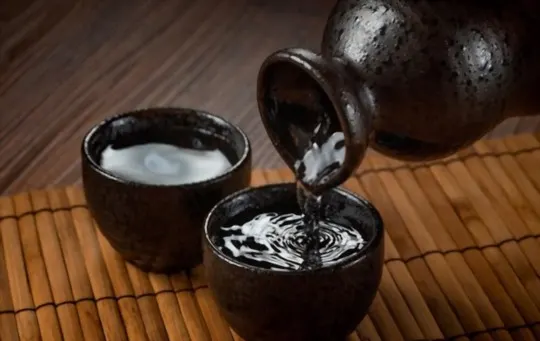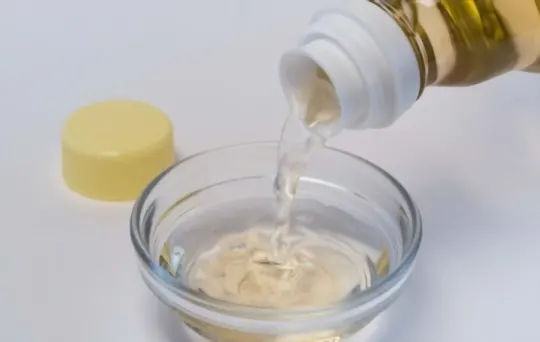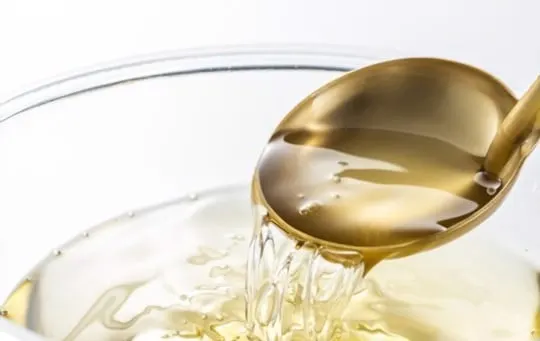Ever run out of mirin in the middle of cooking? Finding ourselves in this pickle is more common than you’d think.
Mirin, a staple in Japanese cuisine, adds that unique sweet-tangy kick. It’s not just any ingredient; it’s key for that authentic touch.
Yet, here we are, mirin-less. Panic? Not us.
We’ve got the next best things lined up. Substitutes that save the day and your dish.
Five contenders, ready to step in. Each brings something special to the table, literally.
Ready for a quick fix that doesn’t skimp on flavor? You’re in the right spot.
What is Mirin?

Mirin is a rice wine used in Japan to make sauces and glazes.
It is similar to sake but has much lower alcohol content and higher sugar content.
It has a sweet flavor and a clear consistency that makes it ideal for cooking.
It is typically used to make teriyaki or sweet-and-sour sauce but can be added to other foods like stir fry vegetables, eggplant, and tofu.
Mirin comes in a clear bottle and is easily mistaken for water.
It is often stored next to sake in the Asian section of a supermarket or sold in a grocery store.
The alcohol content is negligible, so it can be enjoyed by pregnant or abstain from drinking.
The alcohol in mirin acts as a preservative to keep for several months after opening.
For this reason, it is a popular cooking ingredient in Japan.
The 5 Best Substitutes for Mirin
Mirin is a sweet rice wine commonly used in Japanese cooking to add depth of flavor and a touch of sweetness to various dishes.
However, if you don’t have mirin on hand or are looking for alternative options, there are several substitutes that can provide similar characteristics.
In this guide, we will explore the top 5 substitutes for mirin, comparing their key characteristics and providing suggestions on proper ratios to achieve delicious results in your recipes.
| Substitute | Key Characteristics | Proper Ratio |
|---|---|---|
| Dry Sherry | Rich and nutty with a hint of sweetness | Use an equal amount of dry sherry as a substitute |
| Sake | Light and slightly sweet with a delicate flavor | Use an equal amount of sake as a substitute |
| Rice Wine Vinegar | Tangy and acidic with subtle sweetness | Use half the amount of rice wine vinegar compared to mirin |
| White Wine | Crisp and fruity with a touch of acidity | Use an equal amount of white wine as a substitute |
| White Wine Vinegar | Sharp and tangy with a subtle sweetness | Use half the amount of white wine vinegar compared to mirin |
Now let’s dive into each substitute in more detail:
1 – Dry Sherry

Dry sherry is an alcoholic beverage produced from white grapes.
This wine has a high alcohol content, typically between 15 and 22%.
The drink is popular in Spain and South America, particularly Chile.
Sherry has a sharp taste along with a yeasty flavor.
It can be used as a substitute for mirin because it contains sugar, a critical component of mirin.
It can be used as a substitute for mirin when making teriyaki sauce.
This ingredient acts as a sweetener and helps balance out the salty taste of soy sauce.
In addition, sherry will add depth to your dish.
In some cases, dry sherry may also have additional flavor.
Remember that it may have a nutty or salty flavor, so use it sparingly.
- Key Characteristics: Dry sherry is a fortified wine with a rich and nutty flavor profile. While it may not mimic the exact sweetness of mirin, it can provide depth and complexity to your dishes.
- Proper Ratio: Use an equal amount of dry sherry as a substitute for mirin. Adjust the quantity based on your taste preferences and recipe requirements.
2 – Sake

Sake is traditional Japanese alcohol that has been celebrated and treasured for over 1,200 years.
Although it resembles white wine, sake is fermented rice with added yeast and water.
It can be enjoyed on its own or as an ingredient in cooking.
Though not as sweet as mirin, sake may be used as a substitute when making marinades or glazes.
As mentioned earlier, sake will add depth to your meal with the perfect balance of sweet and salty flavors.
It is optimal for use in teriyaki sauce but can also be used with soy sauce on meat or vegetables.
Sake may have a stronger flavor than mirin, so adding it slowly and over low heat is best.
- Key Characteristics: Sake is a traditional Japanese rice wine with a light and slightly sweet flavor. It shares similarities with mirin in terms of sweetness and can provide a delicate touch to your dishes.
- Proper Ratio: Use an equal amount of sake as a substitute for mirin. Adjust the quantity based on your taste preferences and recipe requirements.
3 – Rice Wine Vinegar

Rice wine vinegar is a popular ingredient in Asian cuisine.
It contains a higher acidity level than other rice vinegar types and tastes tangy on the palette.
In addition to cooking, it can be used as a dipping sauce for fried foods or vegetables.
This product has less sugar than mirin but does have an equal acidity.
When used in cooking, rice wine vinegar is an excellent substitute for mirin when making chicken.
It will add the perfect flavor to your meal without being too sweet or cloying.
Rice wine vinegar adds a punch that will have your mouth singing with delight.
- Key Characteristics: Rice wine vinegar is tangy and acidic, with a subtle sweetness. While it lacks the alcohol content found in mirin, it can provide a similar balance of flavors to your recipes.
- Proper Ratio: Use half the amount of rice wine vinegar compared to mirin as a substitute. Adjust the quantity based on your taste preferences and recipe requirements.
4 – White Wine

White wine does not have as much sugar as mirin but can be used in some cases to replace this important ingredient.
If you are new to cooking with wine, white is a great place to start.
It has more fruity notes than dry sherry, and the flavor pairs nicely with new or basmati rice.
Chicken is one of the most common meats in Asian cuisine and can easily be made with white wine.
White wine has less alcohol content than mirin, so it is safe for anyone to consume, including pregnant women or those who abstain from drinking.
It also contains fewer calories. To reduce the tart flavor of white wine, use it in equal parts with water.
- Key Characteristics: White wine offers a crisp and fruity flavor profile with a touch of acidity. Although it may not provide the same level of sweetness as mirin, it can add a pleasant complexity to your dishes.
- Proper Ratio: Use an equal amount of white wine as a substitute for mirin. Adjust the quantity based on your taste preferences and recipe requirements.
5 – White Wine Vinegar
White wine vinegar is a popular ingredient in the Mediterranean and Latin American cuisine and Thai cooking.
It has less acidity than rice wine vinegar, making it a perfect substitute for mirin when you want a sweet flavor without an overwhelming amount of tartness.
Like white wine, this product contains similar levels of alcohol and sugar to mirin.
Mirin and white wine vinegar make a great substitute when making fried rice.
When using this product in your food, add it slowly and mix thoroughly to balance added ingredients such as soy sauce.
White wine vinegar is also good for delicate dishes with subtle flavors.
- Key Characteristics: White wine vinegar is sharp and tangy, with a subtle sweetness. It can provide a similar acidic element to your recipes, but be cautious as it lacks the sweetness of mirin.
- Proper Ratio: Use half the amount of white wine vinegar compared to mirin as a substitute. Adjust the quantity based on your taste preferences and recipe requirements.
Conclusion
Mirin is a sweet Japanese rice wine that is the backbone of many Asian dishes.
However, it can be difficult to find depending on where you live or your dietary restrictions.
Fortunately, several great substitutes are available for each ingredient with similar flavor profiles.
As always, be sure to use your best judgment when cooking.
Only substitute ingredients if necessary, and remember that these products cannot act as a direct replacement.
While it may take a little trial and error to find the perfect ratios, we hope this guide will help you in your quest to recreate these delicious dishes.

The 5 Best Substitutes for Mirin
Ingredients
- Dry Sherry
- Sake
- Rice Wine Vinegar
- White Wine
- White Wine Vinegar
Instructions
- Pick your favorite substitute from the list above.
- Follow cooking directions for your selected substitute with the proper ratio of ingredients.

Andrew Gray is a seasoned food writer and blogger with a wealth of experience in the restaurant and catering industries. With a passion for all things delicious, Andrew has honed his culinary expertise through his work as a personal chef and caterer.
His love for food led him to venture into food writing, where he has contributed to various online publications, sharing his knowledge and insights on the culinary world. As the proud owner of AmericasRestaurant.com, Andrew covers a wide range of topics, including recipes, restaurant reviews, product recommendations, and culinary tips.
Through his website, he aims to inspire and educate fellow food enthusiasts, offering a comprehensive resource for all things food-related.

Leave a comment